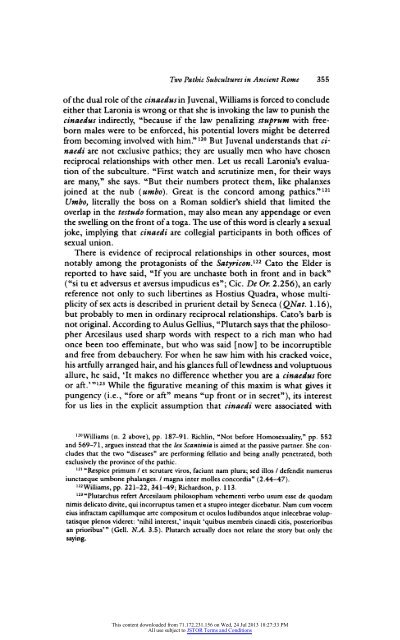Two Pathic Subcultures in Ancient Rome
Two Pathic Subcultures in Ancient Rome
Two Pathic Subcultures in Ancient Rome
You also want an ePaper? Increase the reach of your titles
YUMPU automatically turns print PDFs into web optimized ePapers that Google loves.
<strong>Two</strong> <strong>Pathic</strong> <strong>Subcultures</strong> <strong>in</strong> <strong>Ancient</strong> <strong>Rome</strong> 355<br />
of the dual role of the c<strong>in</strong>aedus <strong>in</strong> Juvenal, Williams is forced to conclude<br />
either that Laronia is wrong or that she is <strong>in</strong>vok<strong>in</strong>g the law to punish the<br />
c<strong>in</strong>aedus <strong>in</strong>directly, "because if the law penaliz<strong>in</strong>g stuprum with freeborn<br />
males were to be enforced, his potential lovers might be deterred<br />
from becom<strong>in</strong>g <strong>in</strong>volved with him." 120 But Juvenal understands that c<strong>in</strong>aedi<br />
are not exclusive pathics; they are usually men who have chosen<br />
reciprocal relationships with other men. Let us recall Laronia's evaluation<br />
of the subculture. "First watch and scrut<strong>in</strong>ize men, for their ways<br />
are many," she says. "But their numbers protect them, like phalanxes<br />
jo<strong>in</strong>ed at the nub (umbo). Great is the concord among pathics."'2'<br />
Umbo, literally the boss on a Roman soldier's shield that limited the<br />
overlap <strong>in</strong> the testudo formation, may also mean any appendage or even<br />
the swell<strong>in</strong>g on the front of a toga. The use of this word is clearly a sexual<br />
joke, imply<strong>in</strong>g that c<strong>in</strong>aedi are collegial participants <strong>in</strong> both offices of<br />
sexual union.<br />
There is evidence of reciprocal relationships <strong>in</strong> other sources, most<br />
notably among the protagonists of the Satyricon.'22 Cato the Elder is<br />
reported to have said, "If you are unchaste both <strong>in</strong> front and <strong>in</strong> back"<br />
("si tu et adversus et aversus impudicus es"; Cic. De Or. 2.256), an early<br />
reference not only to such libert<strong>in</strong>es as Hostius Quadra, whose multiplicity<br />
of sex acts is described <strong>in</strong> prurient detail by Seneca (QNat. 1.16),<br />
but probably to men <strong>in</strong> ord<strong>in</strong>ary reciprocal relationships. Cato's barb is<br />
not orig<strong>in</strong>al. Accord<strong>in</strong>g to Aulus Gellius, "Plutarch says that the philosopher<br />
Arcesilaus used sharp words with respect to a rich man who had<br />
once been too effem<strong>in</strong>ate, but who was said [now] to be <strong>in</strong>corruptible<br />
and free from debauchery. For when he saw him with his cracked voice,<br />
his artfully arranged hair, and his glances full of lewdness and voluptuous<br />
allure, he said, 'It makes no difference whether you are a c<strong>in</strong>acdus fore<br />
or aft.' "123 While the figurative mean<strong>in</strong>g of this maxim is what gives it<br />
pungency (i.e., "fore or aft" means "up front or <strong>in</strong> secret"), its <strong>in</strong>terest<br />
for us lies <strong>in</strong> the explicit assumption that c<strong>in</strong>acdi were associated with<br />
20Williams (n. 2 above), pp. 187-91. Richl<strong>in</strong>, "Not before Homosexuality," pp. 552<br />
and 569-71, argues <strong>in</strong>stead that the lex Scant<strong>in</strong>ia is aimed at the passive partner. She concludes<br />
that the two "diseases" are perform<strong>in</strong>g fellatio and be<strong>in</strong>g anally penetrated, both<br />
exclusively the prov<strong>in</strong>ce of the pathic.<br />
121 "Respice primum / et scrutare viros, faciunt nam plura; sed illos / defendit numerus<br />
iunctacque umbone phalanges. / magna <strong>in</strong>ter molles concordia" (2.44-47).<br />
122<br />
Williams, pp. 221-22, 341-49; Richardson, p. 113.<br />
123"Plutarchus refert Arcesilaum philosophum vehementi verbo usum esse de quodam<br />
nimis delicato divite, qui <strong>in</strong>corruptus tamen et a stupro <strong>in</strong>teger dicebatur. Nam cum vocem<br />
cius <strong>in</strong>fractam capillumque arte compositum et oculos ludibundos atque <strong>in</strong>lecebrae voluptatisque<br />
plenos videret: 'nihil <strong>in</strong>terest,' <strong>in</strong>quit 'quibus membris c<strong>in</strong>acdi citis, posterioribus<br />
an prioribus'" (Gell. N.A. 3.5). Plutarch actually does not relate the story but only the<br />
say<strong>in</strong>g.<br />
This content downloaded from 71.172.231.156 on Wed, 24 Jul 2013 18:27:33 PM<br />
All use subject to JSTOR Terms and Conditions
















